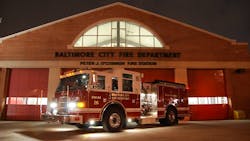Baltimore City Department Using OT for Third of Shifts
By Kevin Rector
Source The Baltimore Sun
The Baltimore City Fire Department is paying overtime to fill nearly a third of its firefighter and medic shifts every day, blowing through its overtime budget.
The department is relying heavily on volunteer “callbacks,” in which firefighters or medics who have just finished a shift are asked to work another, said a department spokeswoman.
It also is shuffling personnel around, moving firefighters who are also certified as medics from scheduled firefighting shifts to particularly short-staffed medical units.
On average, about 30 percent of the 371 fire and medical shifts the department must fill each day are going to personnel working for extra pay, confirmed Blair Adams, the spokeswoman.
Partly as a result, the department has used up its $11.2 million overtime budget for this year, despite there being more than three months left on the fiscal calendar, Adams confirmed.
Last year, the department spent more than $18.2 million on overtime, surpassing its $10 million overtime budget.
Adams said the shortage of regularly scheduled firefighters and medics that is driving the need for overtime work is due to a variety of factors, including employees who are on leave for health reasons, military service or as a disciplinary measure. In some cases, such leaves begin on short notice.
“You can kind of anticipate it from a business standpoint,” she said. “It’s a big agency, with over 16,000 members, so there are a number of things going on.”
Asked whether a business that regularly operates with 30 percent of its staff on overtime pay is anticipating its staffing needs well, Adams said, “We utilize our resources the best way we can.”
City Councilman Brandon Scott, chairman of the public safety committee, asked the department about its staffing decisions in recent oversight hearings.
He said the fact the department is spending so much on overtime — just like the Baltimore Police Department — is a sign that the administration is not doing appropriate oversight.
“It’s clear that accountability measures that were there in the past — with CitiStat, etc. — aren’t there,” Scott said. “That is why the council has stepped up and stepped in to have these oversight hearings, to try to highlight issues, to have as much accountability as we can.”
CitiStat, started under then-Mayor Martin O’Malley, was once a citywide force of data collection and pressure on administrators to demonstrate efficiency and proper management within their agencies. Under subsequent mayors, the office no longer published reports on its website, and critics said it lost steam.
Mayor Catherine Pugh has focused instead on collaborative Violence Reduction Initiative meetings, where administrators from all city agencies talk about improving neighborhoods.
She did not respond to a request for comment on this article.
Baltimore has a relatively large number of fires, compared to cities of similar size. Meanwhile, the need for paramedics has risen across the country in recent years — in part due to the exploding opioid epidemic, which has reached historic levels in Baltimore.
The Fire Department has struggled for years to deal with overtime. At an oversight hearing last month before Scott, Fire Chief Niles Ford said the department had a faulty payment system that had been miscalculating overtime pay since at least 2017 and still wasn’t fixed.
The department’s overtime reliance recalled a similar practice by the Police Department, which also has had trouble filling scheduled shifts and spends millions of dollars more a year on overtime than it budgets for.
The police union recently said that officers were stretched so thin that they were, on a nightly basis, being told to respond only to the worst and most violent 911 calls for hours at at time. The Police Department did not deny that account, and has acknowledged that it is hundreds of officers short and relies on overtime to fill shifts.
But it said that’s expected to improve after a recent change to officers’ schedules, under which they routinely work five days a week instead of four.
Adams said the Fire Department is not considering any schedule changes. Its medics, which make up a large portion of the vacant shifts, typically work four days, then have four days off.
And, asked how many vacant positions the department has, Adams declined to answer, saying that figure doesn’t have an impact on overtime.
“Regardless if we hire more personnel or not, there’s almost always overtime opportunities,” she said. “Hiring additional personnel will not negate the fact that overtime will be available.”
The fire union did not respond to requests for comment.
However, the union recently negotiated substantial salary increases for emergency medical technicians who rise to become an EMT/firefighter or a paramedic. A paramedic can administer intravenous drugs and provide more advanced medical care than an EMT.
Adams said the raises are a “great incentive” for Fire Department personnel to learn skills — making them more versatile and able to fill different vacant positions — and view their work “not just as a job, but a career.”
She said Ford, who just received a salary raise to $210,000 a year, is “always encouraging members of this department to advance as far as they can in this agency. The opportunities are endless.”
———
©2019 The Baltimore Sun
Visit The Baltimore Sun at www.baltimoresun.com
Distributed by Tribune Content Agency, LLC.






